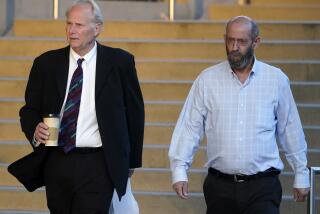Crew Chief’s Hearing Postponed in Helicopter Tampering Case
- Share via
A hearing on whether Sea Stallion helicopter crew chief Cpl. Kirk Hill will be formally charged in his admitted tampering with a military aircraft at the Tustin Marine Corps Air Station was postponed Wednesday to allow the defense more time to prepare its case.
“It’s a potential capital case,” said Capt. Thomas May, who represented Hill at the hearing Wednesday. “We should do a thorough investigation and not rush through it.”
May argued that Hill had asked to be defended by a specific Marine lawyer stationed at Camp Pendleton, but as of Wednesday had not received a written response to the request. May argued that it was impossible for Hill to put together his defense without knowing who was representing him.
Prosecutor’s Argument
But the prosecutor, Capt. Bradley N. Garber, argued that the hearing should not be delayed, because Hill and May had known that the request for the specific lawyer had been verbally denied and that a written response was in the mail.
Garber also argued against a postponement on grounds that at least one important government witness may be shipped out of the country before he can testify. But the defense agreed to put an administrative hold on the witness to delay his departure until after he testifies.
The hearing at the El Toro Marine Corps Air Station was continued until Jan. 11.
Hill, 24, was relieved of his crew chief duties aboard a CH-53A Sea Stallion helicopter Oct. 26, when he reportedly switched connections on gauges to prove that pilots flew with unworkable instruments, endangering their lives and the lives of crew members riding in the rear of the helicopters.
The case will be presented to hearing officer Capt. Thomas Scully, who will make a recommendation to commanding officers on whether to press court-martial charges against Hill of dereliction of duty, hazarding a vessel or damaging government equipment. Scully could recommend that charges be reduced or that none be placed.
May said a charge of hazarding a vessel could carry a penalty of capital punishment.
The hearing, under Article 32 of the Uniform Code of Military Justice, is the equivalent of a civilian grand jury, called to determine if there is a basis for any formal charges.
Hill told a newspaper reporter that he tampered with the gauge, and the pilot flew the helicopter even though the instrument was not working. Hill was placed under investigation and barred from working around the helicopters when he reported to his superiors what he had done.
More to Read
Sign up for Essential California
The most important California stories and recommendations in your inbox every morning.
You may occasionally receive promotional content from the Los Angeles Times.










